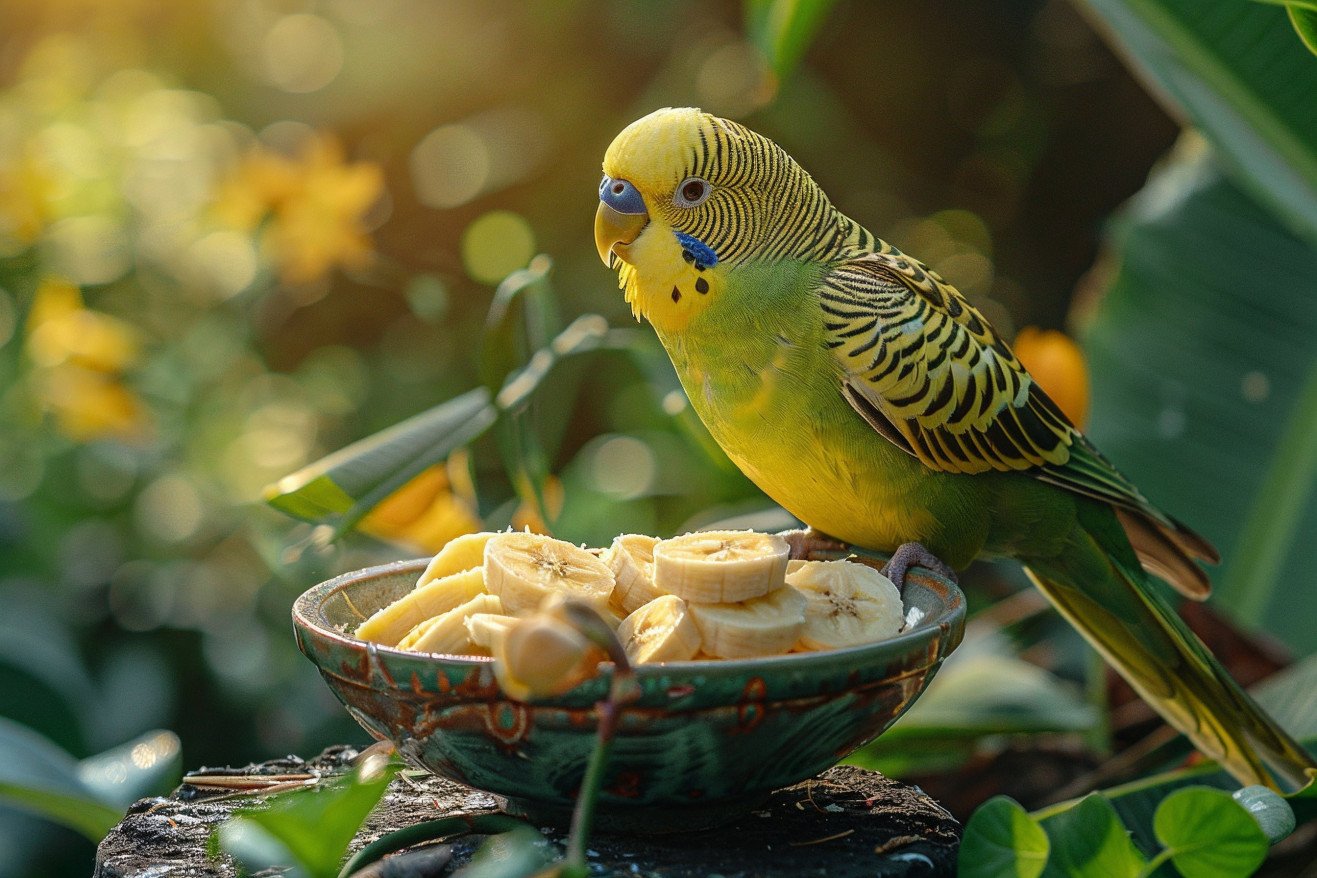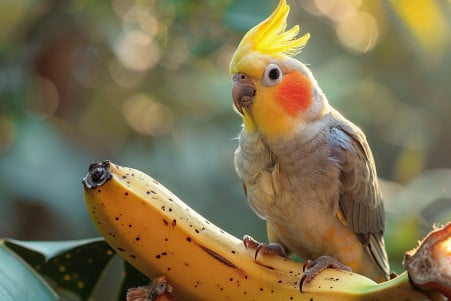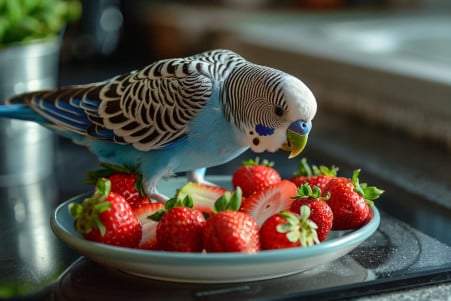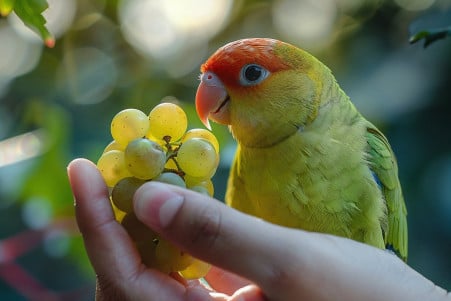Can Parakeets Eat Bananas? A Guide to Fruits in Your Bird’s Diet
16 February 2024 • Updated 16 February 2024

Parakeets are known for their colorful diet, but can these colorful birds add bananas to the mix? The answer is yes, parakeets can eat bananas and they can benefit from the natural sugars, fiber, vitamins, and minerals they contain.
Make sure to cut up ripe bananas into small pieces and only offer them as an occasional treat, with 3–5 small slices being the maximum amount you give your parakeet in a week to avoid throwing off their diet.
To make sure you have a complete understanding of how to give your parakeet bananas, this article will cover a wide range of research on avian nutrition and veterinary dietary recommendations. It will cover the ins and outs of parakeet dietary requirements, the pros and cons of bananas, and how to incorporate fruit into their diet.
By looking at the most recent information from animal nutritionists and bird owners, this article will make sure you have the knowledge you need to make the best choices for your bird’s health.
Can parakeets eat bananas?
How to Create a Balanced Diet for Your Parakeet
A balanced diet that includes all the necessary nutrients, like proteins for muscle repair, carbohydrates for energy, and fats for cell function, is important for your parakeet’s overall health. In addition to these macronutrients, avian veterinarians stress the importance of ensuring that your bird gets the right balance of vitamins and minerals, especially calcium, which is important for bone and brain health.
In the wild, parakeets are granivorous, which means they mainly eat grains and seeds. However, this type of diet is not nutritionally complete when it comes to pet parakeets.
Adding fruits to your bird’s diet can help ensure that they get a wide range of nutrients that can help supplement their basic diet. Bird experts recommend that 60–80% of your bird’s diet be made up of a high-quality pellet, with the rest of their diet being made up of a variety of fresh fruits and vegetables.
This will help ensure that your bird gets a well-rounded diet that will help prevent nutritional deficiencies and the health problems that can come with them, like liver and kidney disease, which can be caused by an unbalanced diet.
In addition to providing extra vitamins and minerals, fruit treats, like bananas, can also provide other benefits. A varied diet will also provide your bird with mental stimulation, which can come from the behavioral benefits of experiencing different tastes and textures.
This well-rounded diet will also help ensure that your bird gets the right balance of nutrients. This is important when it comes to understanding how your bird’s digestive system works and how it will respond to new foods like fruits.
How Food Moves Through a Parakeet’s Digestive System
Parakeets have a unique digestive system that is specifically adapted to their diet. Like other birds, parakeets don’t have teeth and instead use their beak to break down food before swallowing. Once swallowed, food passes through the esophagus and into the crop, where it is stored and softened.
From there, it moves on to the two-part stomach: the proventriculus for enzymatic digestion and the gizzard, or muscular stomach, where the parakeet grinds up food, often with the help of grit that they have ingested.
The gizzard is especially important when it comes to processing fruits, as parakeets use it to grind up food in the absence of teeth. This is particularly important when it comes to processing harder, more fibrous materials that are found in some fruits. An article on ScienceDirect about avian digestion also emphasizes the importance of a healthy glycocalyx layer that lines the intestine, protecting the microvilli that are responsible for absorbing nutrients.
That said, it’s important to be careful. The Merck Veterinary Manual lists a number of digestive issues that can affect parakeets, including yeast infections and parasitic infections, which can cause symptoms like weight loss, regurgitation, and lethargy.
This is a good reminder for parakeet owners to be mindful of the fruits they are feeding their pets. They should also be on the lookout for signs of digestive issues, like undigested seeds or diarrhea, when they introduce new foods to their pets’ diets.
How to Safely Add Bananas to Your Parakeet’s Diet
Bananas are a delicious and nutritious snack for parakeets. Birdwatching Buzz explains that they are a good source of essential vitamins, potassium, and fiber that can help keep your parakeet healthy.
However, when adding bananas to your parakeet’s diet, it’s important to remember that they should be given in moderation. The site suggests that a good portion size is a small piece, about 1–2 inches long, once a week to make sure that it’s a treat and not a regular part of their diet.
The preparation is easy but important; Pet Keen says that you should make sure to wash the banana thoroughly to remove any pesticides, especially if you plan to leave the skin on. Then, cut the banana into small pieces to make sure that it’s easy for your bird to eat without choking.
If you want to mix it up a bit, you can also mix mashed banana with other safe fruits, like blueberries or strawberries.
Parakeet Blog explains that other fruits that are safe for parakeets, like apples and grapes, also have a variety of health benefits. However, you should always avoid avocados and chocolate, which can be poisonous to birds. By following these tips, you can make sure that you’re adding these sweet snacks to your parakeet’s diet in a way that’s healthy and safe.
Pros and Cons of Feeding Your Parakeet Bananas
In small amounts, bananas can be a good source of several important nutrients for your parakeet. According to Chipper Birds, bananas are a great source of antioxidants, vitamins A and C, potassium, and essential minerals, which help with hydration, electrolyte balance, gut health, and the immune system.
Meanwhile, vitamin B-6 helps with immunity and skin health, and calcium is important for strong bones. Magnesium is important for nerve and brain health, and bananas also contain copper, vitamin C, manganese, vitamin B-5, and iron, although in smaller amounts.
That said, there are some important things to note about feeding your parakeet bananas. For one, overfeeding can lead to obesity and developmental issues, especially in young parakeets, and can also lead to iron storage disease.
In addition, Chipper Birds warns that the high potassium content can be dangerous for birds with kidney or liver issues. If you’re feeding your parakeet banana peels, it’s important to make sure they’re organic to avoid the pesticides and chemicals that are often found on the skin.
As with any new food, make sure to watch your parakeet closely after you introduce bananas to see if they experience any digestive issues. If you’re feeding them in moderation and as part of a well-rounded diet, bananas can be a healthy and happy addition to your parakeet’s diet.
Mimicking the Parakeet’s Wild Diet
In the wild, parakeets, or budgerigars, eat a varied diet that includes seeds, fruits, vegetables, and even the occasional insect. Bird Street Bistro explains that parakeets have evolved to search for fresh seeds and water in their natural Australian environment. As a result, they are predisposed to seek out a wide range of foods, which in turn helps them maintain a well-rounded diet that meets their nutritional needs and supports their overall well-being.
When it comes to feeding parakeets in captivity, this means that their diet should include a variety of different foods. A study referenced by ExoticDirect explains that parakeets eat a mix of seeds, nuts, and fruits, such as bananas, in the wild. This suggests that while bananas aren’t a major part of their diet in the wild, they can still be a fun treat for pet parakeets.
So, to mimic the foraging behavior of wild parakeets, a pet parakeet’s diet should include a mix of fruits, vegetables, and seeds that are similar to what they would eat in the wild. By learning about and replicating these natural food preferences, pet parents can ensure that their parakeets’ diets meet their nutritional needs and satisfy their natural instincts.
This will help ensure that our avian friends are healthy and happy and living a life that’s as close to their natural diet as possible.
Conclusion: Parakeets and Bananas, a Healthy Mix
After taking a closer look at parakeets and their relationship with bananas, we can confirm that these colorful birds can eat bananas and benefit from them. Bananas provide important vitamins, minerals, and fiber to a parakeet’s diet, as long as they are fed in moderation. We’ve also learned that it’s important to make sure that the banana is part of a well-balanced diet that includes other fruits, vegetables, high-quality pellets, and seeds.
We’ve also learned that it’s important to make sure that the banana is part of a well-balanced diet that includes other fruits, vegetables, high-quality pellets, and seeds.
It’s important to be cautious when adding bananas to your parakeet’s diet, to make sure they are prepared properly, and to make sure they are fed in small amounts.
This will help mimic the parakeet’s natural diet and their need for variety, which is similar to the rich and varied diet of their wild relatives. We’ve also learned what to look for to make sure your parakeet is getting everything they need from their diet and when to make changes.
If you want to make sure that you are providing your parakeet with the best diet possible, you may want to talk to an avian vet. These experts can provide you with personalized nutritional advice that is tailored to your bird’s unique needs. Just remember, while variety is important, especially when it comes to feeding your feathered friends, so is making sure that they are getting everything they need in moderation.


